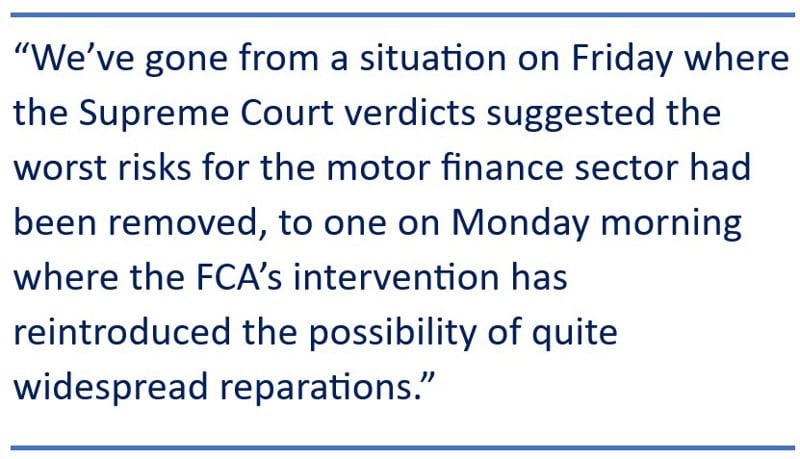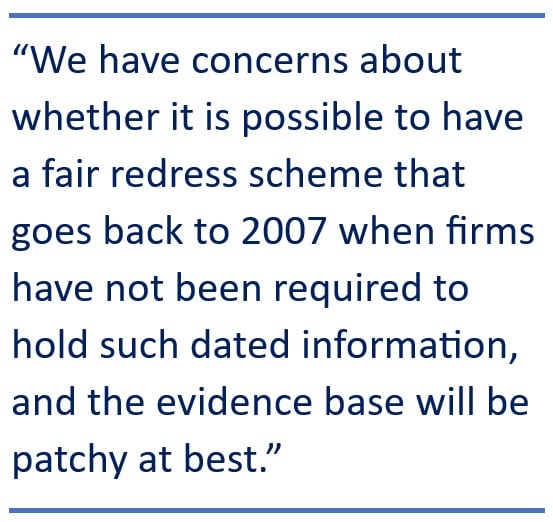The UK’s monetary regulator has reignited uncertainty throughout the motor finance business after outlining the probably scope of a compensation scheme which may see payouts totalling as a lot as £18 billion for patrons doubtlessly mis-sold loans.
Whereas the ultimate price of the redress scheme will hinge on its eventual design, the Monetary Conduct Authority (FCA) warned that the invoice is unlikely to come back in under £9 billion – and will soar a lot increased.
The choice follows the August 1 landmark ruling by the Supreme Court docket which discovered that sure fee preparations between motor finance lenders and sellers may have resulted in an unfair relationship with clients – notably when excessive or discretionary commissions weren’t disclosed.
“Our detailed evaluation of the previous use of motor finance has proven that many corporations weren’t complying with the legislation or our disclosure guidelines that have been in power after they offered loans to shoppers,” mentioned the FCA which reckons that almost all automobile consumers will probably obtain lower than £950 in compensation.
“The place shoppers have misplaced out, they need to be appropriately compensated in an orderly, constant and environment friendly method.”

Paul Hollick, chair, Affiliation of Fleet Professionals, voiced the dismay of many within the business following the August 1 ruling which had initially been welcomed as a wonderful end result, reflecting the essential position and duties of intermediaries, lenders and clients, restoring certainty and readability to the biggest point-of-sale shopper credit score market within the UK.
“We’ve gone from a state of affairs on Friday the place the Supreme Court docket verdicts steered the worst dangers for the motor finance sector had been eliminated, to 1 on Monday morning the place the FCA’s intervention has reintroduced the potential of fairly widespread reparations.
“It means we’re going to stay in a state of affairs of appreciable uncertainty till the redress scheme is finalised in October.
“We’d wish to see the entire state of affairs resolved as quickly as attainable. Sure, shoppers whose authorized rights have been ignored must be recompensed pretty however the motor finance market additionally must return to regular functioning as quickly as attainable.”
On the coronary heart of the problem are so-called discretionary fee preparations (DCAs), which allowed sellers to regulate rates of interest – usually growing them to obtain increased fee payouts.
The Supreme Court docket discovered that such practices, if inadequately disclosed, may breach shopper safety legal guidelines.
Though not all commission-related options are inherently unfair, the FCA mentioned lenders should now put together for scrutiny over how preparations have been structured and communicated to clients.
Brian Nimmo, head of redress at monetary companies consultancy Broadstone, predicted final week that though the August 1 ruling was a partial win for a motor finance business, suppliers “weren’t out of the woods but”.
“DCA circumstances will now have to be checked out on a case-by-case foundation,” he mentioned. “The FCA is anticipated to develop its redress scheme to cope with this improvement however the way it will assist them determine if a case is ‘unfair’ is the nice unknown.
“Because of this, finance firms will nonetheless must evaluation all of their DCA circumstances, assess whether or not they’re unfair after which calculate potential redress, which can be a big train.”
The FCA redress scheme is anticipated to cowl each discretionary and a few non-discretionary fee fashions and can what position components reminiscent of fee measurement, buyer sophistication, and disclosure high quality ought to play in figuring out eligibility for compensation.
 If carried out as deliberate, the scheme would apply to finance agreements courting again to 2007 – aligning with the Monetary Ombudsman’s remit and aimed toward avoiding a wave of courtroom challenges.
If carried out as deliberate, the scheme would apply to finance agreements courting again to 2007 – aligning with the Monetary Ombudsman’s remit and aimed toward avoiding a wave of courtroom challenges.
The FCA can also be weighing whether or not the scheme ought to function on an opt-in or opt-out foundation. Both method, corporations can be anticipated to actively notify affected clients.
“The FCA is quickly messing this up and, if not cautious, they would be the goal for unfairness claims, by no means thoughts lenders and sellers,” mentioned automotive authorized knowledgeable Jonathan Butler of Geldards.
The lawyer added: “Implementing something apart from an arbitrary scheme is one factor – and will not be easy – paying out is one other. My guess is it will likely be nicely into 2026 if not past earlier than payouts are made.”
Compensation calculations are prone to fluctuate relying on the particular hurt suffered. The FCA is contemplating a technique just like the Supreme Court docket’s ruling within the Johnson case, the place the lender was required to repay the fee in full. Curiosity funds on redress can be set at a easy annual fee of round 3%, primarily based on common base charges plus 1%.
Adrian Dally, director of motor finance on the lending business physique, the Finance and Leasing Affiliation, famous issues over whether or not it’s possible to have a good redress scheme that goes again to 2007 “when corporations haven’t been required to carry such dated info, and the proof base can be patchy at greatest”.
Ian Plummer, Auto Dealer’s chief business officer, identified that whereas it might be a while earlier than the business is aware of precisely how the method of revealing fee can be enacted, putting the suitable steadiness can be key.
“A practical resolution that minimises the affect on an business that contributes billions to our economic system, but additionally a shopper centric method that ensures transparency and confidence for hundreds of thousands of consumers,” he mentioned.
The FCA mentioned it plans to launch its session in early October, operating for six weeks. Remaining guidelines are anticipated to be in place by the tip of 2025, paving the way in which for funds to start in 2026.
Till then, corporations do not need to answer motor finance complaints earlier than 4 December 2025 – a deadline that could be prolonged in keeping with the scheme’s timetable to stop a surge in disjointed claims.
Talking to sector analysts, FCA chief Nikhil Rathi confirmed that an annual 2 million clients depend on motor finance with lending of round £40 billion. “Between 2007 to 2020 … there have been 25.9 million motor finance agreements, of which 14.6 million operated with a discretionary fee association with round £8.1 billion estimated fee paid throughout that interval,” he mentioned.
Commenting on the FCA’s announcement of a redress scheme, Jack Nicholls, motor finance sector lead at Aptean Reply which labored carefully with finance companies in the course of the PPI scandal, mentioned: “The motor finance business should take heed of the exhausting classes from the PPI scandal. Poorly executed redress schemes do not simply injury reputations – they drive up prices and result in shopper distrust.
“With the FCA now confirming that redress is legally owed, lenders face a pivotal second. Preparation is not non-compulsory. Scalable, resilient infrastructure should be in place to deal with the calls for forward. The sector now has readability and the period of ambiguity is over. Now the main focus should shift from uncertainty to execution.”

